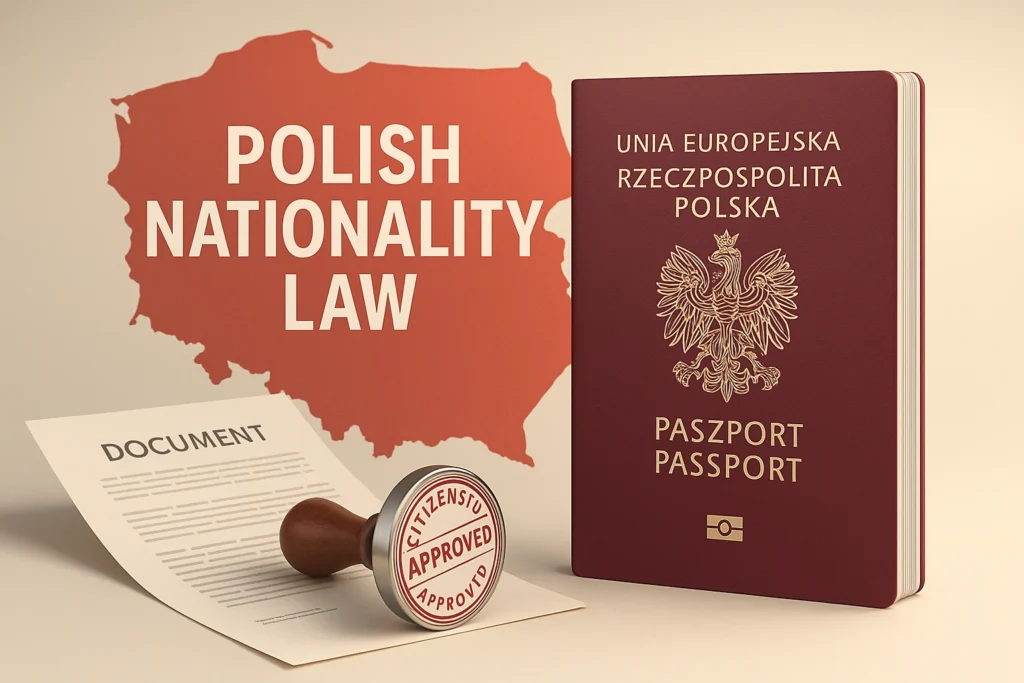Polish nationality law tells who can be a citizen of Poland. It sets the rules for how people can get this status. Some are born with it. Others must apply.
The law protects national identity. It also gives legal rights to those who qualify. People with Polish roots often want to know how the system works.
Many people become citizens because of family ties. Others move to Poland and want to join the country legally. Some lost their Polish citizenship long ago and want it back.
Poland gives different paths for these people. This guide explains how you can become a Polish citizen in a clear, easy way.
Citizenship Through Family Blood
Poland uses the law of blood, not the law of land. This means a child of a Polish parent becomes a Polish citizen. The place of birth does not matter. A baby born outside Poland can still be Polish. One Polish parent is enough.
This rule passes through many generations. Even if your grandparents left Poland, you may still qualify. You must show documents. These can include birth records, marriage papers, and old passports. You also must prove that your ancestor did not lose Polish status.
If your family member took another country’s citizenship before 1951, you may not qualify. Poland once did not allow dual nationality. Many people who moved to other countries gave up their Polish ties. That rule blocks many from claiming today.
You must check if your family member became a citizen of another country before or after 1951. That year marked a change. It affects many families from the U.S., Canada, and other places. Knowing the year helps you understand your legal path.
Citizenship from Being Born in Poland
This rule surprises many people. Poland does not follow the idea of getting citizenship through place of birth.
A child born in Poland can become a citizen only in rare cases. This happens when both parents have no citizenship.
Another case is when the parents are unknown. In those situations, Poland gives the child citizenship to prevent statelessness.
If someone leaves a baby in Poland and the parents cannot be found, the child becomes Polish. If later the parents are found, the citizenship may change. This rule helps children who have no home country.
Foreign parents who have a baby in Poland do not pass on Polish nationality. The child takes the status of the parents. If the parents later become Polish, they can ask the state to include the child. It must be done through legal steps.
Becoming a Citizen Through Recognition
Recognition means the Polish state accepts you as a citizen. This path suits people who have lived in Poland for a long time. You must follow the rules and apply through a local office.
To qualify, you must live in Poland with legal permission. You must speak Polish. You must have a clean criminal record. You must also show that you are part of society in Poland.
Each case depends on how long you have lived in the country. Spouses of Polish citizens may apply after three years. Refugees can apply earlier. Most people need to stay at least ten years before they can ask.
You must pass interviews and language checks. You must show steady income. If your documents are not strong, your request may be denied. Many people succeed when they show strong ties to the country.
Getting Citizenship Through the President
The President of Poland can give citizenship to anyone. There are no set rules. It is a free choice made by the President.
People ask the President when other options do not work. Some have special skills or personal reasons. Others have family in Poland but cannot prove their link. This path is open to people with strong personal stories.
You must write a request. Include your story and why you want to be Polish. Include support letters if possible. Some people get help from officials or lawyers.
This way does not need you to speak Polish or live in Poland. But it does need strong reasons. The process may take a long time. You must be honest and clear in your request.
Restoring Lost Citizenship
Some people had Polish citizenship but lost it long ago. Poland lets some people get it back. This is called restoration. It helps people who lost citizenship before 1951.
Many lost their status due to war or forced change. If your ancestor gave up citizenship or took another country’s passport before 1951, you may apply. You must show the link and the reason the citizenship was lost.
This path is not the same as naturalization. It brings back something you once had. If approved, you get full Polish rights again.
The Ministry of Interior handles these cases. You must show strong family records. This includes birth certificates, travel papers, and more. Many Jewish, Ukrainian, or other groups use this method.
How You Can Lose Citizenship
Since 2009, you cannot lose Polish citizenship without asking. The only way to lose it is to request it. You must ask the President and get approval.
Some people give it up to join another country’s army or government. Others need to do it for legal reasons. Once you give it up, it is hard to get back.
If you become a citizen of another country, you still keep your Polish status. Poland allows dual citizenship. But inside Poland, you are seen only as a Polish citizen.
This means you must use a Polish passport in Poland. You must follow Polish laws. If you face a court case in Poland, your other nationality does not matter. These rules can affect your travel and legal rights.
Dual Citizenship in Poland
Poland lets people hold two citizenships. You can be Polish and belong to another country, too. But Poland sees you as only Polish when you are in the country.
You must use your Polish passport at the border. You must obey Polish law. You vote, work, and pay taxes like any other Polish person.
This rule may confuse some people. It is wise to learn what it means before traveling. You may face legal duties like military service.
Not all countries allow dual nationality. Before you apply, check your other country’s law. If both sides accept it, you enjoy more freedom and rights.
Applying From Outside Poland
Many people start the process outside Poland. They use Polish consulates or embassies. This works for those who live far but still want to claim their Polish rights.
To apply, collect birth, marriage, and other family documents. Get translations if needed. Some cases need legal help. Many firms offer this service.
Consulates send your papers to the offices in Poland. They do not decide your case. You must wait for months in some cases. Be patient and follow all steps.
Once accepted, you can apply for a Polish passport. You must register your birth and marriage with the Polish offices. Then you can use your new rights.
Bottom Lines
Polish law gives many ways to become a citizen. Each path has clear steps. Some are fast. Others take time.
Poland welcomes people with strong links. It values family ties, history, and clear goals. If you show these things, you have a chance.
Good documents and simple steps help. Stay patient. Ask questions. Follow the rules. If your case is strong, you can join the millions who hold a Polish passport.
Common Questions
What is Polish nationality law based on?
It is based on family descent, not place of birth.
Can I get Polish citizenship through my grandparents?
Yes, if they did not lose their Polish status before 1951.
Does Poland allow dual citizenship?
Yes, but in Poland, you are seen only as a Polish citizen.
Can I apply from outside Poland?
Yes, through Polish consulates or embassies.
Is it easy to get Polish citizenship?
It depends on your documents, history, and legal path.
Disclaimer: This article shares general legal information. It is not legal advice. Contact an expert or consulate for personal guidance.



